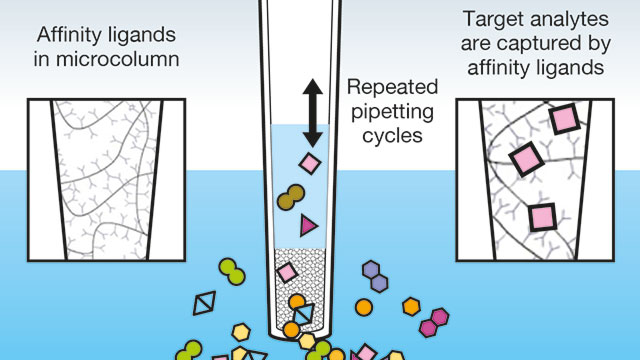How Next Generation Large Molecule Bioanalysis Technology Works
When combined with the inability to standardize and transfer analytical methods between labs, the conventional methods for large molecule analysis become inefficient.

Problem: Sample preparation and extraction steps for the quantification of large molecules can be complicated, and laborious to optimize due to the complexity of biological samples that contain numerous background proteins and peptides. Furthermore, the analyses of such samples is especially challenging, since the background peptides and proteins compete with the large molecule of interest, creating interference problems which impact accuracy. As a result, biopharmaceutical, translational, clinical, and sports anti-doping labs performing high throughput characterization of large molecules face several challenges, including insufficient sensitivity at low levels of detection (picogram quantities); high background noise and carryover; low efficiency, making the process time consuming; as well as sub-standard data quality and reproducibility. When combined with the inability to standardize and transfer analytical methods between labs, the conventional methods for large molecule analysis become inefficient.
Solution: Researchers need an efficient method for large molecule bioanalysis, which provides meaningful quantitative and qualitative data from reproducible high throughput testing. Thermo Scientific™ Mass Spectrometric Immunoassay (MSIA) microcolumn technology is a novel affinity capture method for large molecule bioanalysis. It enables users to easily affinity purify the target analyte from complex biological matrices, for downstream analysis using different detection methods.
MSIA technology is based on proprietary monolithic microcolumns, densely coated with a target-specific affinity ligand for effective and efficient analytical grade affinity purification of even low abundance target analytes. Simple aspiration and dispensing of a sample through these microcolumns drives interaction between the affinity ligands linked to microcolumns and the target analyte. Housed within a pipette tip, these microcolumns create a versatile and user-friendly affinity capture device that provides the flexibility to analyze sample volumes from 10 μL to mL quantities. The analytical affinity purification provided by MSIA technology is essential for large molecule bioanalysis in Ligand Binding Mass Spectrometric Immunoassays (LB-MSIA), a hybrid workflow that is rapidly emerging as a key solution to address biotherapeutic innovation and biological complexity of large molecules.
Assays can be developed faster, incubation time is decreased, and smaller sample volumes can be used compared to traditional affinity purification methods. MSIA technology is designed to provide labs with a cost-effective and time saving alternative for large molecule bioanalysis. With the ability to provide significantly reduced nonspecific binding and improved analytical sensitivity, data is reliable and accurate with minimal analytical variability. These ready-to-use microcolumns are resistant to compression and therefore are less likely to clog.
MSIA technology streamlines large molecule bioanalysis with simple push button automation. The Thermo Scientific™ Versette™ automated liquid handler and the Tecan Freedom EVO® series with MCA96 liquid handling arm are available for analysis of target analytes in a high throughput 96-well format. Alternatively the Thermo Scientific™ Finnpipette™ Novus i multichannel electronic pipette is suited for low throughput or assay development work.
The eluted analytes can be analyzed with different detection methods based on the requirements of the experiment. SDS-PAGE/Western blot can be used to provide a fast read out, UV/Vis for absorbance based detection, or LC-MS can be utilized to obtain quantitative and qualitative data simultaneously.
The fast paced nature of biopharmaceutical drug discovery and development demands a need for sophisticated methods of large molecule bioanalysis. The next generation LB-MSIA combines the robust nature of ligand binding assays with high resolution accurate mass (HRAM) spectrometric detection. This combination provides a highly sensitive, accurate, and reproducible method for the generation of high value data for the analysis of protein biologics such as therapeutic antibodies, antibody drug conjugates, and fusion proteins.
For more information, please visit thermofisher.com/msia
